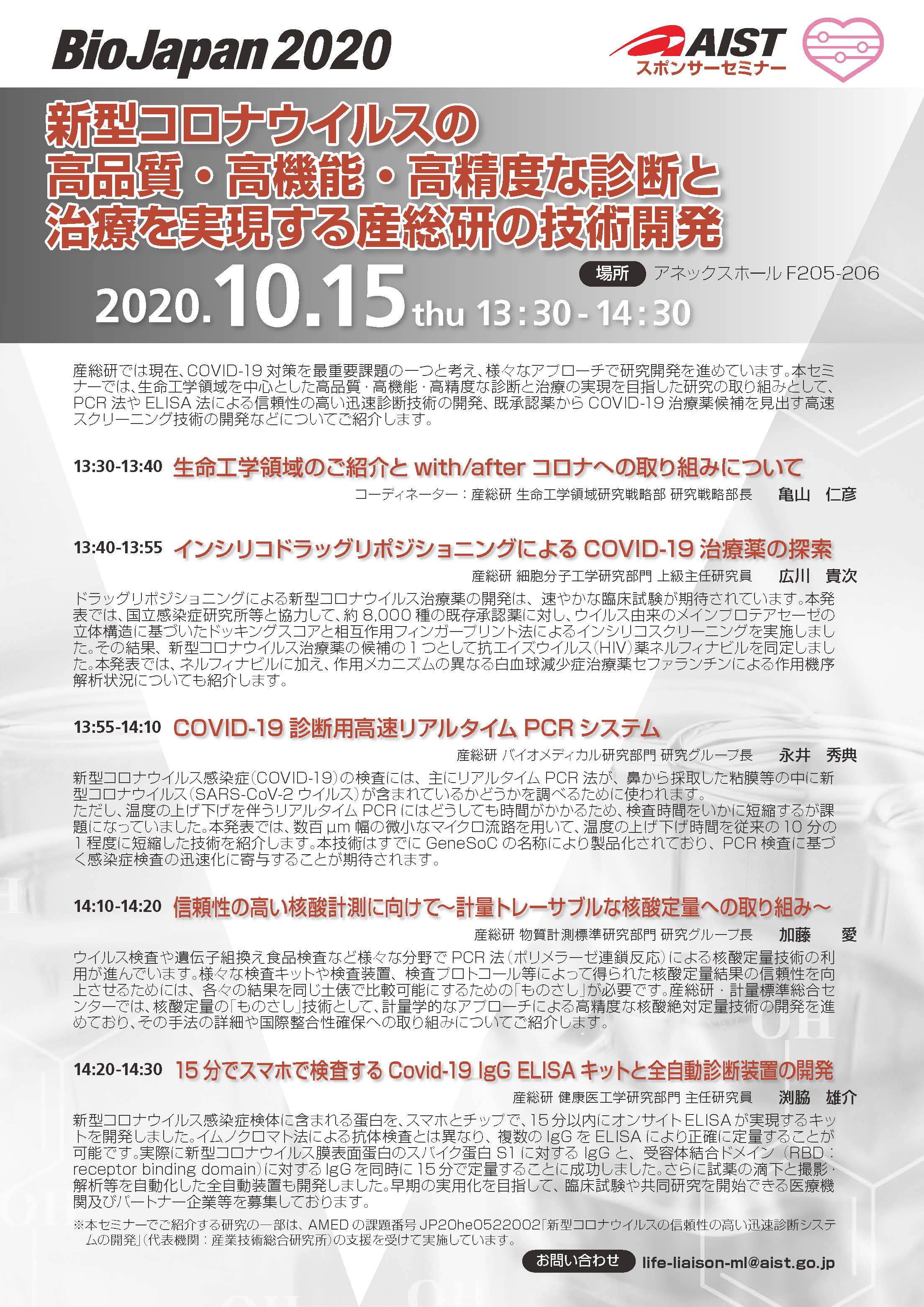Technology development to realize
high-quality, high-performance, and high-precision
diagnosis and treatment of COVID-19
2020.10.15 Thu. 13:30~14:30
Annex Hall F205-206

Annex Hall F205-206
| Summary | AIST considers COVID-19 prevention and control to be one of the most important issues and is carrying out research and development from various approaches.
In this seminar, we will introduce our research towards the realization of high-quality, high-performance, highly accurate diagnosis and treatment; such as the development of reliable and rapid diagnostic technology by micro-channel PCR chip, quantitative PCR with calibration and antibody test by ELISA, and repositioning of approved drugs as candidates of COVID-19 therapeutic agents by in silico screening.
| |
| [1] | 13:30-13:40 Mission and strategy of our R&D in post-COVID-19 era Kameyama Kimihiko, Deputy Director General, Department of Life Science and Biotechnology, AIST |
|
| [2] | 13:40-13:55 In silico approaches to drug repositioning for COVID-19 Hirokawa Takatsugu, Chief Senior Researcher, Cellular and Molecular Biotechnology Reseach Institute, AIST | |
| In silico prediction based on the protein structures of SARS-CoV2 is effective to find the putative drug candidates from the approved drugs, as drug repositioning. The main protease, 3CL protease, of SARS-Cov2 is essential for proteolytic maturation of the virus, and inhibiting its function will prevent the growth of COVID-19. We adopted an in silico docking-based screening approach, which combines molecular docking with a protein-ligand interaction fingerprint (PLIF) scoring method, utilizing the crystal structure of SARS-Cov2 3CL protease (PDB: 6LU7) and a database of known drugs (KEGG-Drug). Selected drugs have the binding modes similar to PLIF of the known active N3 inhibitors with favorable docking scores. One hundred and several dozen potentially candidate drugs were identified for 3CL protease inhibitors, which are already approved as antiviral, HIV protease inhibitors, antibacterial or antineoplastic agents. | ||
| [3] | 13:55-14:10 Rapid real-time PCR system for COVID-19 diagnosis | |
| In the case of new coronavirus infectious disease (COVID-19), the real-time PCR method is mainly used to examine whether the mucosa collected from the nose contains SARS-CoV-2 virus. However, since conventional real-time PCR systems need long time for assay, how to shorten the inspection time has been an issue. In this presentation, we will introduce a technology that shortens the time for raising and lowering the temperature to about 1/10 of the conventional one by using a microchannel with a width of several hundreds of μm. This technology named “GeneSoC” has already been commercialized and is expected to contribute to rapid diagnosis based on real-time PCR for infection diseases. | ||
| [4] | 14:10-14:20 NMIJ's challenges to establish metrological traceability for nucleic acid quantification | |
| The use of nucleic acid quantification technology by PCR (polymerase chain reaction) is getting increased in various field such as virus testing and genetically modified food testing. To improve the reliability of nucleic acid quantification results obtained by various test kits, test devices, and test protocols, etc., a “reference” is needed to make each result comparable on the same level. AIST/NMIJ is developing the highly accurate and absolute quantification technique of nucleic acid as a “reference” method of nucleic acid quantification by using a metrological approach. Here, we introduce our technical details and activities to ensure international comparability of our technology. | ||
| [5] | 14:20-14:30 Smartphone-based Covid-19 IgG ELISA kit and its fully automatic diagnostic device | |
| Using a smartphone and microfluidic chip, we have developted a novel test kit that enables on-site ELISA of analytes in virus infection samples in 15 minutes. Unlike the qualitative test of the immunochromatgraphic test chip, multiple ELISA-based quantification is possible. Indeed, this novel assay kit completed multiple detection of anti-SARS-CoV-2 IgG in serum in 15 minutes. Towards practical use as a medical device, we have developed an anaytical device that automated all operation. |

